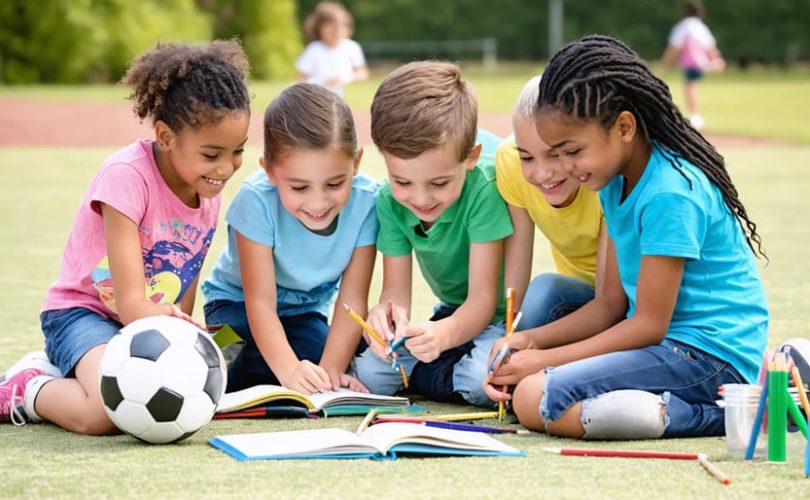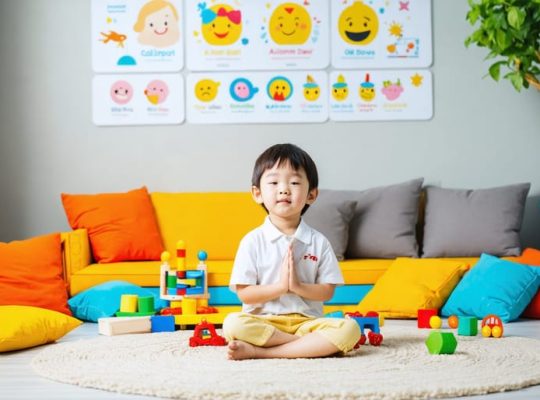Middle childhood (ages 6-12) marks a pivotal stage where children develop crucial social and emotional skills that shape their future relationships and self-identity. Building on their early emotional attachment, children begin forming complex friendships, understanding social hierarchies, and developing a stronger sense of self during these transformative years.
During this period, children navigate increasingly sophisticated social dynamics at school, in extracurricular activities, and within peer groups. They learn to regulate emotions, develop empathy, and understand social rules while building their capacity for meaningful relationships outside the family unit. This stage is particularly crucial as children begin to form their own identity, develop moral reasoning, and gain independence in their decision-making.
Parents and educators play a vital role in supporting healthy psychosocial development by creating safe spaces for emotional expression, modeling positive relationships, and providing opportunities for social interaction. Understanding this developmental stage helps adults guide children through challenges while fostering resilience, self-confidence, and strong interpersonal skills that will serve them throughout their lives.
Key Social Milestones in Middle Childhood
Friendship Formation
During middle childhood, friendships become increasingly complex and meaningful. Children begin to seek out peers who share their interests and values, moving beyond the simple proximity-based friendships of early childhood. They develop deeper understanding of loyalty, trust, and reciprocity, which forms the foundation for lasting relationships.
At this stage, children typically form same-sex friendship groups, though mixed-gender friendships may also occur. These relationships help children develop crucial social skills like empathy, conflict resolution, and cooperation. Through their friendships, they learn to navigate social situations, understand different perspectives, and regulate their emotions.
Children in this age group often have a “best friend” and belong to smaller social circles. They engage in more sophisticated social activities, from organized games to sharing secrets and emotional support. Their friendships become more stable and can last for longer periods, though they may still experience conflicts and friendship changes.
Parents can support healthy friendship formation by creating opportunities for social interaction, helping children develop social skills, and offering guidance when needed. It’s important to remember that each child develops social connections at their own pace, and some may prefer fewer, closer friendships while others enjoy larger social networks.
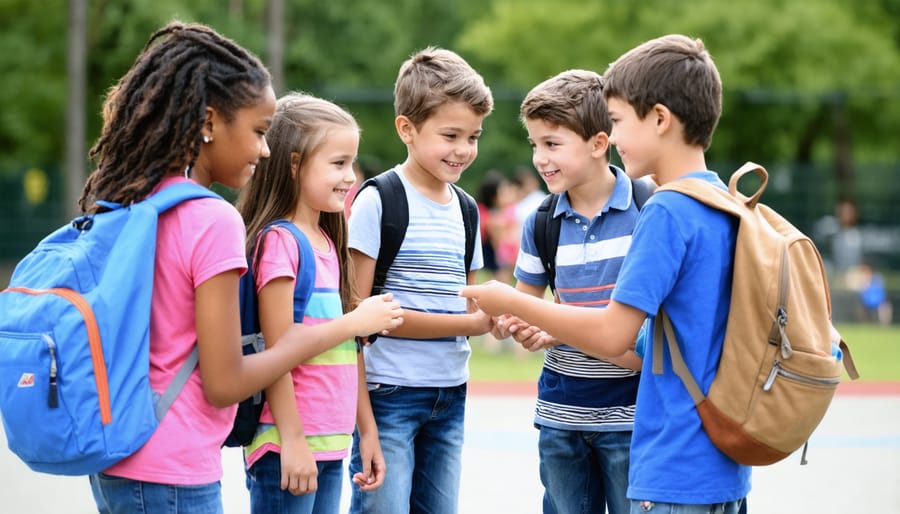
Group Dynamics
During middle childhood, children begin forming more complex social structures and peer groups that significantly influence their development. These groups typically form around shared interests, neighborhoods, or classroom assignments, creating important spaces for social learning and emotional growth.
Children at this age become increasingly aware of social hierarchies and group dynamics. They learn to navigate friendship circles, understand social status, and develop their place within these structures. Some children naturally emerge as leaders, while others may take on different roles within their peer groups.
This period is marked by the formation of closer friendships and the beginning of “best friend” relationships. Children start to value loyalty, trust, and reciprocity in their friendships. They also begin to understand group inclusion and exclusion, which can be both a learning opportunity and a challenge.
Parents and teachers often notice children becoming more selective about their friendships and more sensitive to peer opinions. This heightened awareness of social dynamics can affect their self-esteem and behavior. Supporting children through these experiences while helping them maintain their individuality is crucial for healthy social development.
Essential Social Skills Your Child Needs
Emotional Intelligence
During middle childhood, children develop crucial emotional intelligence skills that help them navigate increasingly complex social situations. They begin to recognize and understand not only their own emotions but also those of others, laying the foundation for meaningful relationships and social success.
Children at this age learn to master their big emotions through daily interactions with peers and adults. They start developing empathy, understanding that others may feel differently about the same situation. For instance, a child might realize that while they’re excited about winning a game, their friend might feel disappointed about losing.
This period marks significant growth in emotional regulation. Children learn to pause before reacting, use words to express feelings, and develop coping strategies for challenging situations. They become better at reading social cues, understanding body language, and responding appropriately to others’ emotional states.
Parents and teachers play a vital role in this development by modeling emotional intelligence and creating safe spaces for children to express themselves. Simple practices like naming emotions, discussing feelings during daily activities, and acknowledging both positive and difficult emotions help children build their emotional vocabulary and confidence.
When children struggle with emotional understanding, it’s important to remember that everyone develops at their own pace. Consistent support, patience, and gentle guidance help children build these essential life skills.
Communication Skills
During middle childhood, children make significant strides in their ability to communicate effectively with others. They develop more sophisticated verbal skills, learning to express their thoughts and feelings with greater clarity and precision. Children at this age begin to understand and use more complex vocabulary, grasp abstract concepts, and engage in meaningful conversations with both peers and adults.
Their storytelling abilities become more refined, allowing them to share detailed accounts of their experiences and create imaginative narratives. They also start to understand different perspectives and can adjust their communication style depending on their audience – speaking differently with friends versus teachers or parents.
Non-verbal communication skills also evolve during this period. Children become more adept at reading facial expressions, body language, and social cues. They learn to interpret tone of voice and understand subtle emotional signals, which helps them navigate social situations more effectively.
Dr. Sarah Martinez, a child development specialist, notes: “This is when children really begin to grasp the nuances of communication. They learn that how they say something can be just as important as what they say.”
Parents can support this development by engaging in regular conversations, encouraging storytelling, and helping children identify and express their emotions appropriately. Creating opportunities for both structured and casual conversations helps children practice these emerging communication skills in a safe, supportive environment.
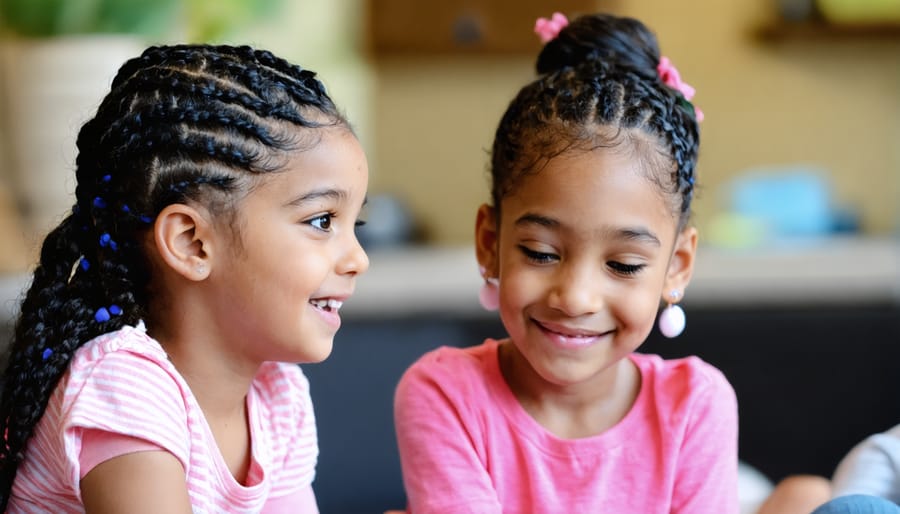
Conflict Resolution
During middle childhood, children begin developing more sophisticated conflict resolution skills as they navigate increasingly complex social situations. They learn that disagreements are a natural part of friendships and that there are constructive ways to handle them.
Children at this age typically move beyond simple “I’m not playing with you anymore” responses and start learning to negotiate, compromise, and find win-win solutions. For example, two children arguing over a toy might learn to take turns or find a different activity they can both enjoy.
Parents and teachers can support this development by modeling healthy conflict resolution and guiding children through difficult situations. Teaching children to use “I feel” statements, listen to others’ perspectives, and brainstorm solutions helps them build these essential skills.
Common conflict resolution strategies that children learn during this period include:
– Taking deep breaths to calm down before addressing the problem
– Using words instead of physical actions
– Taking turns speaking and listening
– Finding compromise solutions
– Seeking adult help when needed
It’s important to remember that children develop these skills at different rates. Some may naturally excel at problem-solving, while others need more support and practice. Offering praise for peaceful conflict resolution attempts, even if imperfect, encourages children to continue developing these important social skills.
Remember that conflicts provide valuable learning opportunities. When adults guide children through disagreements constructively, they help build the foundation for healthy relationship skills that will serve them throughout life.
Supporting Your Child’s Social Development
Creating Social Opportunities
Creating social opportunities during middle childhood doesn’t have to be complicated, but it should be intentional and varied. Start by encouraging participation in structured activities like sports teams, scout groups, or after-school clubs where children can interact with peers who share similar interests. These organized settings provide natural opportunities for developing friendships and practicing social skills.
Playdates remain important during this age, but they can evolve into more complex social arrangements. Consider hosting small group activities at home, such as craft projects, cooking sessions, or gaming gatherings. These informal settings allow children to practice social navigation in a comfortable environment while building meaningful connections.
Community involvement offers another valuable avenue for social development. Encourage your child to participate in neighborhood events, volunteer activities, or religious/cultural groups. These experiences expose children to diverse social situations and help them understand their role in the broader community.
School-based opportunities shouldn’t be overlooked. Support your child in joining study groups, participating in group projects, or attending school events. Work with teachers to ensure your child has opportunities to collaborate with different classmates throughout the year.
Remember that digital connections, when properly supervised, can also supplement in-person social interactions. Video calls with friends, monitored online gaming sessions, or participating in moderated children’s social platforms can help maintain friendships, especially when physical meetups aren’t possible.
The key is to provide a mix of structured and unstructured social opportunities while remaining sensitive to your child’s comfort level and preferences. Some children thrive in large group settings, while others prefer smaller gatherings – both are perfectly normal and should be respected.
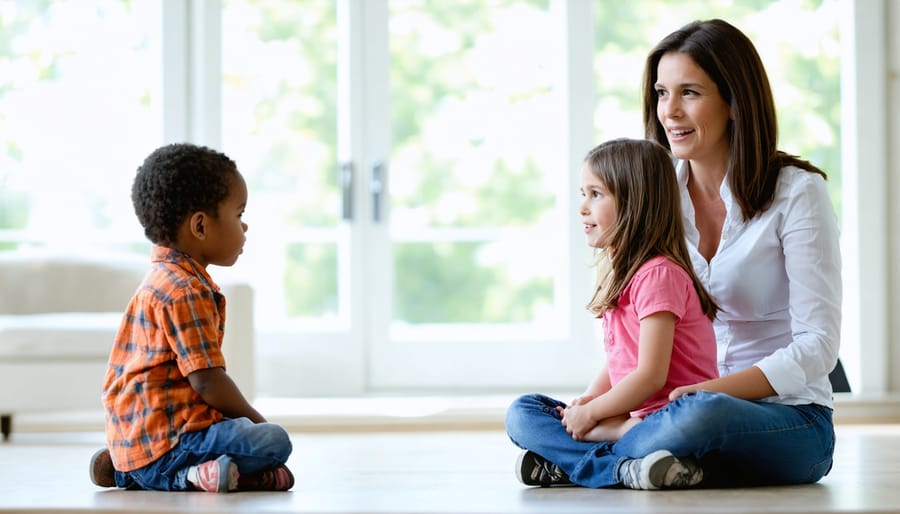
Coaching Through Challenges
When children face social challenges, your supportive guidance can make a significant difference in their development. Start by creating a safe space where your child feels comfortable sharing their concerns without fear of judgment. Listen actively and validate their feelings, even if the problem seems minor from an adult perspective.
Help children develop problem-solving skills by asking open-ended questions like “What do you think could help in this situation?” or “How would you like things to be different?” This approach empowers them to find their own solutions while knowing they have your support.
When conflicts arise with peers, teach constructive communication strategies. Role-playing different scenarios can help children practice expressing their feelings assertively and understanding others’ perspectives. Combine this with emotional regulation activities to help them manage frustration and anxiety in challenging social situations.
Remember to celebrate small victories and progress. If your child successfully navigates a difficult social interaction or shows empathy towards others, acknowledge their growth. This positive reinforcement builds confidence and resilience.
Sometimes, children may need additional support. Watch for signs of persistent social difficulties, such as withdrawal from activities or frequent conflicts. Don’t hesitate to reach out to teachers, school counselors, or mental health professionals if you notice ongoing challenges. Early intervention can prevent minor issues from becoming more significant concerns.
Most importantly, maintain patience and consistency in your support. Social skills develop gradually, and every child progresses at their own pace. Your steady presence and guidance will help them build the foundation for healthy relationships throughout their lives.
When to Seek Professional Help
While most children navigate social development smoothly, certain signs may indicate a need for professional support. If your child consistently struggles to make or maintain friendships, shows extreme anxiety in social situations, or withdraws from peer interactions, these could be red flags worth discussing with a healthcare provider.
Watch for significant changes in behavior, such as suddenly avoiding previously enjoyed social activities, expressing persistent feelings of loneliness, or showing aggressive behavior toward peers. Difficulty understanding social cues, trouble regulating emotions during interactions, or expressing feelings of not belonging may also signal the need for additional support.
Some children may face unique challenges due to neurodevelopmental conditions or other factors affecting their social development. Early intervention can make a significant difference in helping these children develop essential social skills and build confidence.
Consider seeking professional help if your child’s social challenges:
– Persist for several months
– Affect their academic performance
– Impact their daily functioning or happiness
– Cause significant distress at home or school
– Result in physical symptoms like headaches or stomach aches before social situations
Remember, seeking support isn’t a sign of failure – it’s a proactive step toward helping your child thrive. Mental health professionals can provide valuable strategies and tools tailored to your child’s specific needs, ensuring they develop healthy social relationships during these crucial years.
Middle childhood represents a crucial period in a child’s psychosocial development, where the foundations of social competence, emotional intelligence, and self-identity are strengthened. As we’ve explored throughout this article, children aged 6-12 undergo significant changes in how they interact with peers, understand themselves, and navigate their expanding social world.
Remember that every child develops at their own pace, and what matters most is providing consistent support and understanding during this transformative stage. Parents, teachers, and caregivers play vital roles in nurturing healthy social development by creating safe spaces for children to practice new skills, make mistakes, and learn from their experiences.
Continue to encourage positive peer relationships, help children develop problem-solving skills, and maintain open communication channels. Watch for opportunities to praise effort rather than outcomes, and celebrate small victories in social situations. Stay attuned to your child’s emotional needs while gradually allowing more independence in social interactions.
If you notice persistent social difficulties or concerns about your child’s development, don’t hesitate to seek guidance from school counselors or child development professionals. With appropriate support and understanding, children can build the social-emotional skills they need to thrive not only during middle childhood but throughout their lives.
By working together – families, educators, and communities – we can create environments that foster healthy psychosocial development and help children become confident, empathetic individuals.

